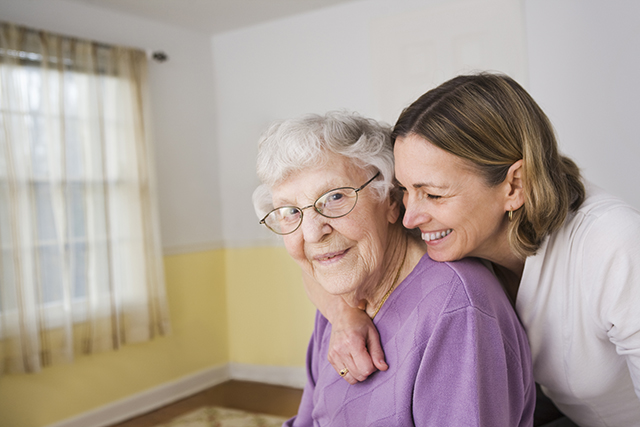Aging may not be something we enjoy thinking about, but it is an inevitable and natural part of life. As we get older, so do the people around us, meaning now might be the right time to start learning more about caring for elderly parents.
No one wants to have to “parent” their parents, but a day may – and likely will – come when older family members can no longer live on their own.
Figuring out how to handle elder care can be daunting. It all starts with an awareness of your parents’ physical, mental and emotional well-being as well as their wishes for the future. Do they need help with simple, daily tasks or more specific, health-related care? What are their hopes when it comes to their final years? How has the pandemic affected them?
Knowing the right questions to ask and some preemptive steps to take can go a long way in lessening familial concerns. This guide about caregiving for elderly parents may help.
Adult Caregivers in America
“There are 40.4 million unpaid caregivers of adults ages 65 and older in the United States,” according to data from the Pew Research Center. “Of that group, nine-in-ten are providing care for an aging relative, and a plurality is caring for a parent.”
Adults between the ages of 45 and 65 are the most likely to be caregivers. “About a quarter (23%) of adults ages 45 to 64 care for an aging adult,” according to Pew Research.
Most (58%) of these caretaking adults are helping their parents with daily tasks and home maintenance, like running errands, doing housework and making home repairs. While a majority (88%) of adults providing care for a 65+ parent find it rewarding, nearly one third of these adults (32%) also find it stressful.
Knowing How to Help
Many times, you’ll only know what others need by asking. Figuring out how to go about caring for elderly parents is a lot easier when everyone is on the same page.
Have a Talk
“92% of Americans think it’s important to discuss their end-of-life wishes,” according to a national survey by The Conversation Project. “Yet only 32% have actually shared their wishes.”
Ask your parents their preferences: How would they like to spend their older years, specifically when it comes to living situations and their wishes for medical care in the case of serious illness? Choosing a primary decision-maker and getting financial affairs and important documents in order can be harder topics to discuss, but are equally necessary.
It’s also important to understand how much care your parents need based on their cognitive health, physical mobility and quality of life, as well as their desire for a social life and proximity to family.
Assessing your parents’ ability to carry out activities of daily living, also known as ADLs, is important as they continue to age. ADLs include eating, getting dressed, functional mobility, bathing and other personal hygiene routines, according to Aging In Place. As ADLs become more difficult, additional assistance is likely necessary.
Offering Assistance
Once you know your parents’ wishes and how they’re doing when it comes to ADLs, you can start making a plan.
Create a list of daily, weekly and monthly to-do’s and assess how manageable they are. Your parents may still be completely capable of remembering to take medications and pay bills, but might need help with transportation to medical appointments and assistance with house and yardwork.
Companionship is another thing to consider. Try organizing visits with siblings, cousins and grandchildren – and even close friends and neighbors – to ensure elderly family members are never lonely.
If you’re having trouble getting family involved in elder care, see these tips from Daily Caring on how to ask family for help.
Know Your Boundaries and Limitations
Caring for elderly parents is not an easy job. It’s important not to forget self-care, especially when caring for others.
Take some time to self-reflect and consider how much care you can realistically give without hindering your own mental, emotional and physical well-being.
Your own schedule and responsibilities may keep you from visiting older relatives as often as you’d like or need. You may also not feel comfortable doing certain tasks. Bathing or helping others go to the bathroom may be out of your comfort zone, and that’s OK.
You may need the assistance of a home care provider. Also, certain diagnoses – like dementia and Alzheimer’s – may eventually require specialized care.
Special Services
There are a variety of services that offer in-home, supplemental assistance to make your parents’ lives easier.
Deliveries and Subscriptions
Start with a grocery or food delivery service to make sure your parents are eating well. Then, teach them how to shop online and set up reoccurring deliveries for frequently bought consumables like pet food, cleaning supplies and personal hygiene products.
In-Home Caregiver
If your parents need help with daily tasks, an in-home caregiver is another option.
“Caregivers have found that in some instances the person receiving care can be more cooperative with someone other than the primary caregiver,” according to the Family Caregiver Alliance. “Engaging an attendant can help to preserve your relationship as daughter or partner, rather than always having to be the chore person or taskmaster.”
See tips on hiring in-home help from the FCA here.
Respite Care Services
If you’re providing frequent care for your parents, you might want to consider a respite care service.
“Respite care provides short-term relief for primary caregivers,” according to the National Institute on Aging. “It can be arranged for just an afternoon or for several days or weeks. Care can be provided at home, in a health care facility or at an adult day center.”
Use this National Respite Locator to find a service near you.
Other Programs
Other services worth consideration are adult day programs. These programs offer social and recreational activities for seniors as a means of family support during the day. Find adult day programs near you here.
There are also volunteer senior companion programs, where volunteers visit seniors to offer companionship, conversation and activities like art, games and puzzles.
Looking for more ways to support your elderly parents? AAA members can save on Joy for All Companion Pets, robotic cats and dogs that bring comfort and companionship to those who are aging.

Housing Options
Your parents’ living situation can help dictate how much – and what form of – additional, long-term care they may need.
Staying Close to Family
For the time being, your parents might want to continue living independently. This could mean downsizing to a more manageable property or moving to a location closer to you or other relatives. Another option is moving in with family – whether that be with their kids, grandkids or a sibling – as long as it’s safe and beneficial for everyone involved.
Independent Living Communities
Independent living communities – also called retirement communities – let seniors rent or buy a home, apartment or mobile home and be part of a community of their peers. This kind of housing often includes amenities, like security, group meals and transportation options. Also, residents often won’t have to do yardwork and/or housekeeping.
Assisted Living Communities
Assisted living communities provide staff who help residents with certain daily tasks – like dressing, bathing and meals, along with transportation to medical appointments. While more care is offered here compared to independent living communities, seniors who need medical surveillance and/or more specialized caregiving may be better off in a nursing home.
Nursing Homes
Nursing homes – or skilled nursing facilities – “typically include nursing care, 24-hour supervision, three meals a day and assistance with everyday activities,” according to the National Institute on Aging. “Rehabilitation services, such as physical, occupational and speech therapy, are also available.”
Financial Concerns
Figuring out how to pay for long-term care can be a major source of stress, but there are many options to explore when it comes to affording elder care.
Tax Credits and Deductions
If you are a family caregiver, you can be eligible for federal tax credits and deductions.
Until 2025, the Internal Revenue Service allows family caregivers to claim certain individuals as “other dependents.” Your loved one must be a legal resident who lives with you while you pay 50% of their living expenses. Their income must also be below a certain amount to qualify.
Personal Finances
It’s best to start saving for elder care as soon as possible.
One option is purchasing long-term care insurance. This must be done prior to retirement age – so when you’re in your 40s and 50s. Other options are to save by investing in a 401(k), an IRA or a non-retirement investment account now, so you can pay for care later.
Now may also be the time to start thinking about your will and planning your estate.
Life Insurance
Again, purchasing a life insurance policy is cheaper when you’re young, but it’s never too late to invest in your – and your family’s – future. Policy holders can borrow money against their policy to help pay for post-retirement expenses.
Reverse Mortgages
Adults must be 62 years or older in order to qualify for reverse mortgages. Also known as a home equity conversion mortgage, a reverse mortgage allows senior homeowners to gain access to the equity built up in their home in the form of tax-free loan proceeds. Speak with a AAA reverse mortgage consultant today.
Government Programs
Medicare can pay for some medical costs for people ages 65 and older. This includes “inpatient hospital stays, care in a skilled nursing facility, hospice care and some home health care” (Medicare Part A/Hospital Insurance), “certain doctors’ services, outpatient care, medical supplies and preventive services” (Medicare Part B/Medical Insurance) and “helps cover the cost of prescription drugs” (Medicare Part D), according to Medicare.gov.
Medicaid covers medical care and some types of long-term care for people with limited income.
“Medicaid pays for care for seven out of every 10 nursing home residents, but Medicare generally does not pay for nursing home care,” according to Aging in Place.
The U.S. Department of Veterans Affairs may provide long-term care or at-home care for some veterans. Other programs worth consideration are the Program of All-Inclusive Care for the Elderly and the State Health Insurance Assistance Program.
For more information on government benefits/assistance, visit benefits.gov. For help finding a service, call the National Council on Aging at 571-527-3900.
Additional Elder Care Resources
Every person’s situation is different, meaning you may need more specialized resources.
If you’re finding broaching the topic of elder care difficult, check out these Conversation Starter Guides from The Conversation Project.
Support Groups
Support groups for adult children struggling with elder care can be found at the FCA, Alzheimer’s Association and Cancer Care websites.
Wives, husbands and partners of chronically ill or disabled people can find support through the Well Spouse Association and their nationwide listing of local support groups.
For more information on caring for elderly parents, visit LongTermCare.gov, the National Institute on Aging and its Benefits Checkup or the Area Agency on Aging.
Do you have tips on caring for elderly parents? Share them in the comments.
One Thought on “Caring for Elderly Parents”
Leave A Comment
Comments are subject to moderation and may or may not be published at the editor’s discretion. Only comments that are relevant to the article and add value to the Your AAA community will be considered. Comments may be edited for clarity and length.

















so my mom is disabled and i have spinal stenosis. i do everything for my mom and i never knew i could be getting money for helping. if you wanna know how i help my disabled mom, I clean her messes. i get her food and drinks all day. i do her laundry. i clean the house and cook dinner. i buy all the food. i dont have a job anymore. my dad and brother asked me to quit so i can care for my mother. i have severe pain daily because of spinal stenosis and herniated discs and arthritis but i still help out. i want to buy myself new socks and underwear and clothes. i need toothpaste and hygenics.. no one is paying me to help.. its not fair.. im disabled and i dont get ssi or anything.. i eat once a day and i buy the food with ebt… i deserve to be assigned the role caregiver of parent so i can begin to function as a regular american. i deserve something. [signed] famous koala – joshua of 1990. why the world is better everday